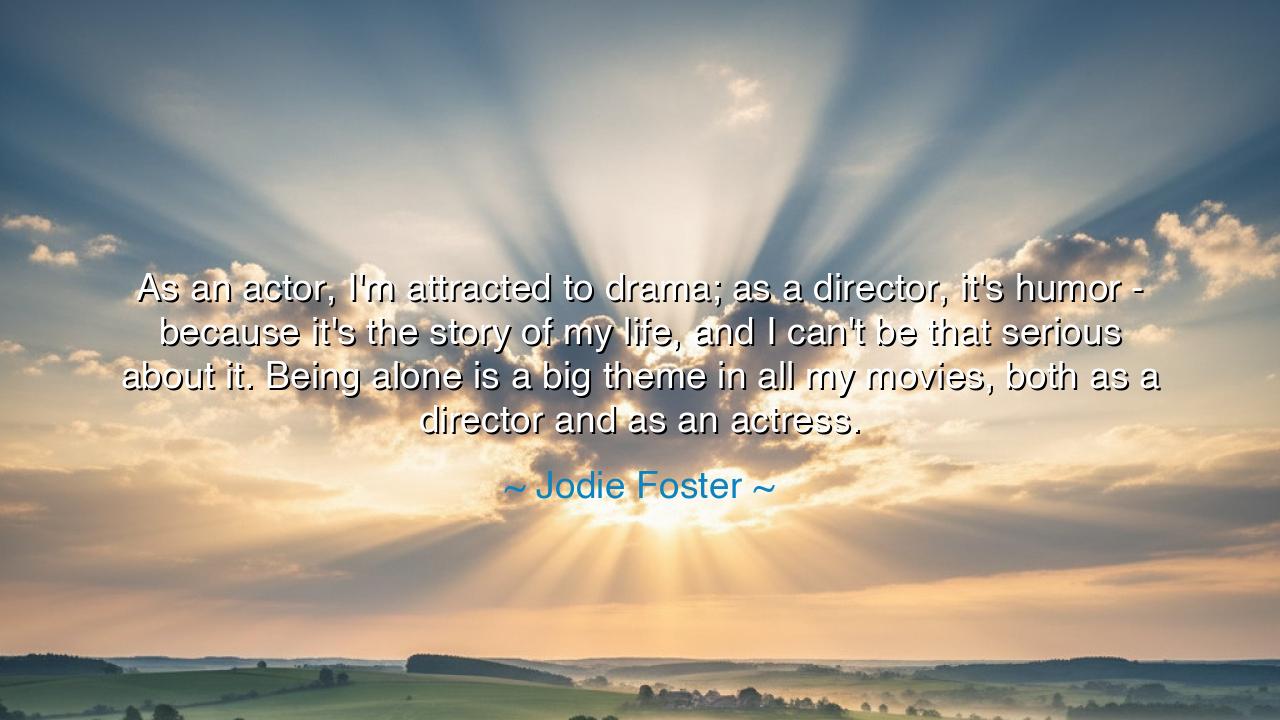
As an actor, I'm attracted to drama; as a director, it's humor -
As an actor, I'm attracted to drama; as a director, it's humor - because it's the story of my life, and I can't be that serious about it. Being alone is a big theme in all my movies, both as a director and as an actress.






In the grand unfolding of life, where each moment is both a story and a lesson, there exists a deep tension—a struggle between drama and humor. As Jodie Foster wisely reflects, "As an actor, I'm attracted to drama; as a director, it's humor - because it's the story of my life, and I can't be that serious about it." In these words, Foster reveals the profound duality of the human experience: the inherent tragic nature of existence, paired with the humorous elements that arise from it. For in life, as in art, there are moments of profound struggle, moments where the weight of loneliness and isolation threatens to crush the spirit, but there are also moments where we find lightness, a kind of grace in the absurdity of it all. This tension between drama and humor, like the threads of fate, weaves the fabric of our lives.
The ancients understood this tension well, for their stories were full of gods and mortals alike, struggling against fate, struggling against their own desires, and yet often finding moments of joy and humor amidst the struggle. Take, for example, the work of Sophocles, whose plays explored the deepest themes of fate, suffering, and self-discovery. But even in his darkest tragedies, there were moments of humor—sharp wit, irony, and the kind of playful defiance that allowed the characters to transcend the weight of their struggles, if only for a brief moment. Similarly, Foster’s recognition of humor in the face of drama reveals the universal truth that we are never fully defined by our suffering; rather, it is in our response to it—our ability to laugh, to create, to reflect—that we find our humanity.
In her role as a director, Foster has chosen to focus on the lightness that humor brings. But this choice is not an escape from the gravity of life’s hardships. Rather, it is an acknowledgment that humor, in all its forms, is not the antithesis of drama, but its counterpart. The great Aristotle, in his exploration of catharsis in tragedy, wrote that through drama, the soul is purified, but it is comedy that restores balance to the heart. Foster’s work, both as a director and actress, embodies this duality—an exploration of the darkness of the human soul, and the lightness that humor brings in response. To take life too seriously, to lose sight of humor, is to be crushed beneath its weight. But to embrace humor, even in the darkest times, is to find the strength to rise.
Consider the story of Heracles, the great Greek hero. Known for his strength and his trials, Heracles' life was one of suffering and struggle, yet he was also known for moments of joy and humor. He was able to balance the weight of his labors with moments of levity, moments where he laughed at the very absurdity of his circumstances. This balance is not just a trait of Heracles, but of all who endure hardship—those who, in the face of adversity, find ways to smile, to laugh, and to continue. It is this balance that Foster embraces in her work—acknowledging that suffering is a part of the journey, but so too is the humor that allows us to transcend it. The great lesson is that life is never solely one or the other—it is both drama and humor, and it is in accepting both that we find the courage to move forward.
The theme of loneliness that Foster mentions is another thread that connects the ancient stories with our own lives. Alone we are often most vulnerable, yet it is in those moments of isolation that we often encounter our deepest truths. The great Stoics—Epictetus and Seneca—knew that solitude was both a teacher and a trial. In the silence of loneliness, they found the opportunity for reflection, for understanding the self and the world. Similarly, Foster’s characters, often surrounded by the weight of their isolation, find humor as a means of connection—a way to bridge the gap between their inner struggles and the outer world. It is through humor that they reach beyond themselves, finding solace in shared laughter, even when alone.
The lesson we can draw from Foster’s reflection is clear: in our own lives, we must not be consumed by the seriousness of our struggles, but also embrace the humor that can be found in our suffering. Life is both tragic and comic, filled with moments that demand both tears and laughter. Just as Foster moves between the gravitas of drama and the lightness of humor, so too must we find the balance in our own lives. Let us acknowledge the weight of our challenges, but let us also find joy in the absurdities of life, in the moments that make us laugh despite ourselves.
Thus, let us remember the ancient truth: that humor and drama are not opposites, but companions on the journey of life. In our own struggles, let us laugh, not as a means of escape, but as a way to confront and transcend the darkness. Let us embrace the duality of existence, knowing that in the tension between suffering and joy, we find the essence of what it means to be human.






AAdministratorAdministrator
Welcome, honored guests. Please leave a comment, we will respond soon